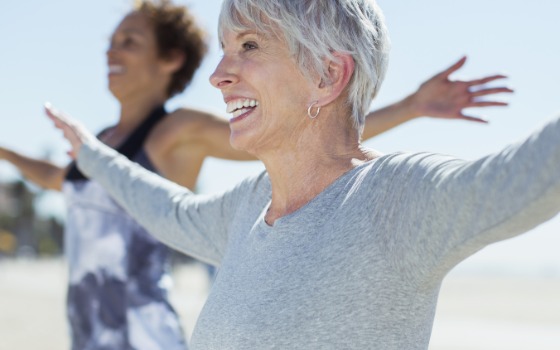How caffeine affects your body
Tea and coffee are some of the most popular drinks in the world. So you’re certainly not alone if you start your day with a mug or two to help you wake up and feel more alert. In fact, in the UK we drink nearly 100 million cups of tea and 95 million cups of coffee a day!
One of the reasons these drinks are so popular is because of their caffeine content. In this article, I discuss how caffeine can affect your body, how much caffeine you should be having, and suggest ways you can cut back.

What are the negative effects of caffeine?
Caffeine is found naturally in around 60 different plants, including coffee beans, tea leaves and cacao beans (which are used to make chocolate). Caffeine acts as a stimulant, which means it increases the activity of your brain and central nervous system.
Caffeine helps to keep you alert and stops you from feeling tired. So it’s no surprise that you might turn to a cup of coffee to get you through an afternoon slump or a long night shift.
Caffeine can have some negative effects on your body, so it’s important to be cautious of how much you’re consuming. Here are some examples of how caffeine can affect your body.
Increase your blood pressure
Caffeine can increase your blood pressure by a small amount for a few hours after you eat or drink it. But the effect is reduced if you regularly drink a moderate amount of caffeine such as around 400 milligrams (mg) of caffeine. This equals about four cups of instant coffee or five cups of tea.
Make you urinate (pee) more
Caffeine stimulates your bladder to produce pee (urine) more quickly than usual. You might find yourself going to the loo more often. Caffeine is thought to cause dehydration, but this effect is small. In fact, the amount of water you consume in a cup of tea or coffee still counts towards your daily fluid intake.
Trigger certain medical conditions
If you have certain medical conditions, you may be particularly sensitive to the effects of caffeine. For example, some people with irritable bowel syndrome (IBS) may find that caffeine triggers symptoms such as bloating, stomach cramps or diarrhoea.
Too much can lead to unpleasant side effects
Too much caffeine – either over the course of the day or in one large dose (like in some energy drinks) – can sometimes cause unwanted side effects. These could include anxiety, restlessness, an irregular heartbeat, or insomnia.
The negative effects of caffeine usually happen when we consume too much, but it’s considered safe to have a moderate amount. Caffeine could even have some medical benefits. Some research is investigating whether caffeine could be used to treat conditions such as depression, Alzheimer’s disease, and Parkinson’s disease.
How much caffeine should you have in a day?
The recommended daily amount of caffeine depends on a few things. If you’re over the age of 18 then the safe daily amount is up to 400mg per day (about four or five cups of coffee). But, if you’re pregnant or breastfeeding, then the safe daily amount is reduced to 200mg per day.
Caffeine might affect children and teenagers differently than adults. In the UK, the recommended safe limits of caffeine in children and teenagers is 3mg/kg body weight. For example, the safe limit for a healthy 10-year-old weighing 30kg would be 90mg caffeine per day (two cups of weak tea).
Some energy drinks can contain more than the recommended daily dose of caffeine for children. You may wish to advise your child to avoid these drinks or monitor the amount of caffeine your child has.
How much caffeine is in certain food and drinks?
The amount of caffeine found in different food and drinks can vary greatly between products, so it’s difficult to know the exact amount of caffeine for sure. But as a rough idea, here is the approximate average caffeine content of some common foods and drinks.
- an espresso (60ml) = 80mg caffeine
- a cup of filter coffee (200ml) = 90mg caffeine
- a cup of black tea (220ml) = 50mg caffeine
- a standard can of cola (355ml) = 40mg caffeine
- an energy drink (250ml) = 80mg caffeine
- a bar of milk chocolate (50g) = 10mg caffeine
- a bar of dark chocolate (50g) = 25mg caffeine
How does caffeine affect your sleep?
Everyone responds to caffeine differently. You might be able to have a mid-afternoon cup of coffee without it interfering with your sleep. Although, research suggests that caffeine can make you sleep for less time and reduce your quality of sleep. If you find that caffeine affects your sleep pattern, you may want to limit your caffeine intake in the late afternoons and evenings.
How can you cut back on caffeine?
You may decide to reduce your caffeine intake to improve your health or prevent any unwanted side effects.
Try these tips to help you cut back.
- Cut back gradually, over several days or weeks. Stopping too quickly can result in withdrawal symptoms, such as headaches, fatigue, and irritability.
- If you have insomnia or struggle to sleep well, avoid drinking caffeinated beverages late in the day or switch to decaf options.
- Remember that caffeine isn’t just found in tea and coffee. It’s also found in lots of foods like chocolate and some fizzy drinks, as well as in some medicines.
- Stay hydrated with other low or non-caffeinated drinks, such as water or green tea.
Are you interested in learning more about your health? Discover more about our range of health assessments.
-
Sources Sources
- Caffeine – What is caffeine? Drug Wise. drugwise.org.uk, updated April 2022
- van Dam RM, Hu FB, Willett WC. Coffee, Caffeine and Health. N Eng J Med 2020;383:369-78. doi: 10.1056/NEJMra1816604
- Evans J, Richards JR & Battisti AS. Caffeine. StatPearls Publishing; 2024 Jan. Updated June 2023
- Fluid – food and drinks: Food Fact Sheet. British Dietetic Association. bda.uk.com, reviewed January 2023
- Why Does Coffee Make You Poop? The IBS and Gut Health Clinic. Ibsguthealthclinic.co.uk, published December 2023
- Food Additives – Regulations and the safety of additives in food. Food Standards Agency (FSA). Food.gov.uk, updated January 2024
- Caffeine and Sleep. Sleep Foundation. Sleepfoundation.org, updated January 2024
- Caffeine: EFSA estimates safe intakes. European Food Safety Authority (EFSA). Efsa.europe.eu, accessed April 2024
About our health information
At Bupa we produce a wealth of free health information for you and your family. This is because we believe that trustworthy information is essential in helping you make better decisions about your health and wellbeing.
Our information has been awarded the PIF TICK for trustworthy health information. It also follows the principles of the The Information Standard.

More diet and nutrition articles
Did you find our advice helpful?
We’d love to hear what you think. Our short survey takes just a few minutes to complete and helps us to keep improving our healthy lifestyle articles.
Legal disclaimer
This information was published by Bupa's Health Content Team and is based on reputable sources of medical evidence. It has been reviewed by appropriate medical or clinical professionals and deemed accurate on the date of review. Photos are only for illustrative purposes and do not reflect every presentation of a condition.
Any information about a treatment or procedure is generic, and does not necessarily describe that treatment or procedure as delivered by Bupa or its associated providers.
The information contained on this page and in any third party websites referred to on this page is not intended nor implied to be a substitute for professional medical advice nor is it intended to be for medical diagnosis or treatment. Third party websites are not owned or controlled by Bupa and any individual may be able to access and post messages on them. Bupa is not responsible for the content or availability of these third party websites. We do not accept advertising on this page.






